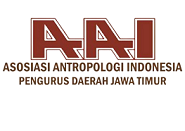The socialization of the independence of migrant workers children
Downloads
The family is the primary socialization agent that has the function to shape the character of children. The presence of both parents in a family is able to provide great opportunities for children to obtain their rights including children who live in migrant workers' families. The thing that caught the attention of the researchers was the process of parenting especially socialization regarding independence carried out by the caregivers, as an effort to form the character of an independent child and fulfillment of children's rights and minimize the label given to children in the family of migrant workers. This study uses qualitative methods. The data collection in this study used in-depth interviews, the determination of the informants in this study used snowball random selection of informants and rolled from one informant to another informant without limitation on the number, in the study there were 7 informants who were caregivers of the children of migrant workers' families, the age of the children cared for is 8-18 years. The theories used in this study are the theory of Symbolic Interactionism from Herbert Blumer and Theory of Socialization Patterns from Elizabeth B. Hurlock. The results obtained from this study are that foster parents have meaning about independence derived from parents, experience and the surrounding environment. The meaning that is owned by foster parents is then disseminated to the children of migrant workers' families. The meaning of independence inherent in foster parents has an impact on the pattern of socialization that is applied to migrant workers' children. Independence is interpreted as disciplinary learning using authoritarian socialization patterns, independence which is interpreted as encouraging children to apply democratic socialization patterns and independence which is interpreted as self-habituation for children using permissive socialization patterns.
Alaazi DA, Salami B, Yohani S, Vallianatos H, Okeke-Ihejirika P, & Nsaliwa C (2018) Transnationalism, parenting, and child disciplinary practices of African immigrants in Alberta, Canada. Child abuse & neglect 86: 147-157. 10.1016/j.chiabu.2018.09.013.
Anak yang Ditinggal Ortu Jadi TKI Banyak Alami Masalah Psikologis (2011) [Diakses Juni 2019]. http://m.detik.com/news/berita/d-1754261/anak-yang-ditinggal-ortu-jadi-tki-banyak-alami-masalah-psikologis.
Lailiyah F (2017) Problematika Pengasuhan Anak Pada Keluarga TKI
(Studi Di Desa Golokan Kecamatan Sidayu Kabupaten Gresik). Skripsi, Universitas Airlangga, Surabaya.
MacDonald EE & Hasting RP (2008) Mindful Parenting and Care Involvement of Father of Children with Intellectual Disabilities. Journal of Child and Family Studies 19 (2): 236-240.
Peta Kabupaten Gresik (2017) [Diakses tanggal 24 Oktober 2020]. https://peta-kota.blogspot.com/2017/01/peta-kabupaten-gresik.html.
Poloma MM (2007) Sosiologi Kontemporer. Jakarta: PT Raja Grafindo Persada
Sukamdi, Wattie AM, Susilastuti DH, Tamtiari W, Pitoyo AJ, Purwatiningsih S, & Kiswanto E (no date) Dampak Migrasi Internasional Terhadap Keluarga dan Anak yang Ditinggalkan: Studi Kasus Indonesia [Diakses Juni 2019]. Indonesiahttp://smeru.or.id/sites/default/files/events/05_the_impacts_of_parental_migration_on_health_and_well-being_-_dr_sukamdi_0.pdf
Sutiana MA, Nandatia RP, A'yun Q, Prayogi AR, Imron A (2018) Pola Pengasuhan Anak pada Keluarga TKW di Kecamatan Srengat Kabupaten Blitar. Paradigma 06 (01): 1-6.
Xu Y, Xu D, Simpkins S, & Warschauer (2019) Does it Matter which Parent is Absent? Labor Migration, Parenting and Adolescent Development in China. J Child Fam Stud 28: 1635-1649. https://doi.org/10.1007/s10826-019-01382-z.
1. The authors agree to transfer the transfer copyright of the article to the Indonesian Journal of Social Sciences effective if and when the paper is accepted for publication. The authors can download the Copyright Transfer Agreement here.
2. The legal formal aspect of journal publication accessibility refers to Creative Commons Attribution-NonCommercial-ShareAlike 4.0 International License (CC BY-NC-SA).
3. Every publication (printed/electronic) is open access for educational purposes, research, and library. Other than the aims mentioned above, the editorial board is not responsible for copyright violation.

IJSS by Unair is licensed under a Creative Commons Attribution-NonCommercial-ShareAlike 4.0 International License.




















